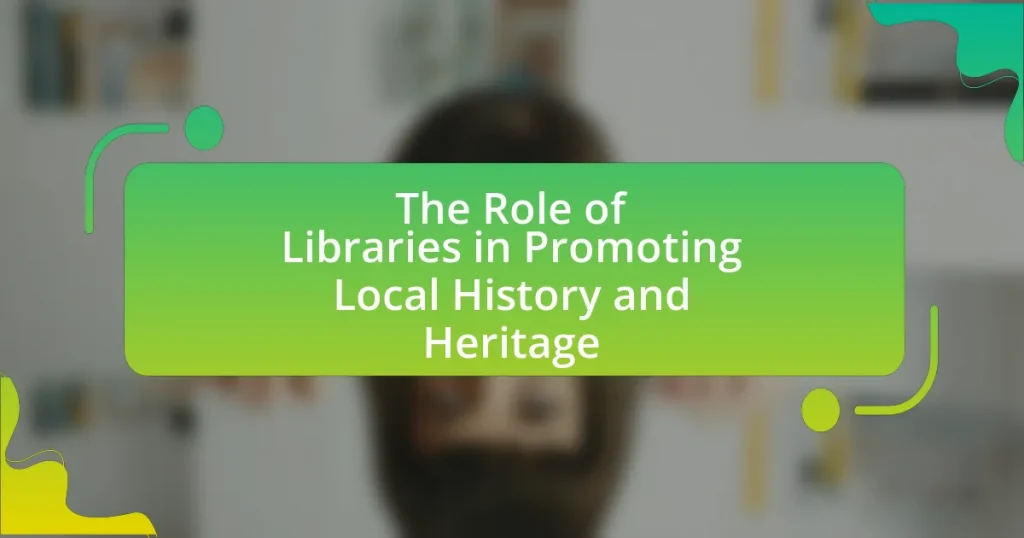Libraries serve as vital institutions in promoting local history and heritage by acting as repositories for historical documents, artifacts, and community records. They collect and preserve various materials, including newspapers, photographs, and oral histories, while also facilitating community engagement through events, workshops, and exhibitions. By collaborating with local organizations and utilizing technology, libraries enhance access to local history resources, fostering a sense of identity and pride among residents. Despite facing challenges such as funding limitations and community engagement, libraries implement strategies to advocate for support and develop innovative programs that connect younger audiences with their local heritage.

What is the role of libraries in promoting local history and heritage?
Libraries play a crucial role in promoting local history and heritage by serving as repositories of historical documents, artifacts, and community records. They provide access to local archives, genealogical resources, and historical texts that help individuals and researchers explore their community’s past. For instance, many libraries host local history collections that include newspapers, photographs, and oral histories, which are essential for preserving the unique narratives of the area. Additionally, libraries often organize events, workshops, and exhibitions that engage the public in local history, fostering a sense of identity and community pride. Through these initiatives, libraries not only safeguard local heritage but also encourage active participation in its exploration and appreciation.
How do libraries serve as custodians of local history?
Libraries serve as custodians of local history by collecting, preserving, and providing access to historical documents, artifacts, and records that reflect the unique heritage of their communities. They maintain archives that include local newspapers, photographs, manuscripts, and oral histories, which serve as primary sources for researchers and the public. For example, many libraries participate in digitization projects to make these resources accessible online, thereby enhancing community engagement and education. Additionally, libraries often host programs and events that celebrate local history, fostering a sense of identity and continuity within the community.
What types of local historical materials do libraries collect?
Libraries collect various types of local historical materials, including manuscripts, photographs, maps, newspapers, oral histories, and archival documents. These materials serve to preserve the unique history and culture of the local community. For instance, many libraries maintain collections of local newspapers that date back several decades, providing insights into historical events and societal changes. Additionally, libraries often archive oral histories from community members, which capture personal narratives and experiences that contribute to the understanding of local heritage.
How do libraries preserve and archive local heritage?
Libraries preserve and archive local heritage by collecting, cataloging, and maintaining materials that reflect the history and culture of their communities. They achieve this through various methods, including the acquisition of local documents, photographs, oral histories, and artifacts, which are then organized in accessible formats for research and public use. For instance, many libraries establish special collections or archives dedicated to local history, often collaborating with local historical societies to ensure comprehensive coverage of significant events and figures. Additionally, libraries may digitize these materials to enhance accessibility and protect fragile items from deterioration, thereby ensuring that local heritage is preserved for future generations.
Why are libraries important for community engagement in local history?
Libraries are important for community engagement in local history because they serve as accessible repositories of historical information and resources that foster a sense of identity and belonging among residents. By providing access to local archives, historical documents, and community records, libraries enable individuals to explore their heritage and connect with their past. For instance, many libraries host events, workshops, and exhibitions that encourage community participation and dialogue about local history, thereby enhancing civic engagement. Research indicates that communities with active library programs see increased participation in local history initiatives, which strengthens community ties and promotes cultural awareness.
How do libraries facilitate community participation in historical projects?
Libraries facilitate community participation in historical projects by providing resources, hosting events, and fostering collaboration among local historians and residents. They offer access to archival materials, historical documents, and digital collections that empower community members to engage in research and storytelling. For example, many libraries organize workshops and lectures that encourage public involvement in local history initiatives, such as oral history projects or heritage preservation efforts. Additionally, libraries often partner with local organizations and schools to create programs that promote awareness and appreciation of local heritage, thereby enhancing community engagement in historical projects.
What programs do libraries offer to educate the public about local heritage?
Libraries offer various programs to educate the public about local heritage, including historical exhibits, workshops, and community events. These programs often feature local history presentations, storytelling sessions, and guided tours that highlight significant historical sites and figures in the community. For example, many libraries collaborate with local historians and cultural organizations to provide educational resources and activities that engage the public in understanding their local heritage. Additionally, libraries may host digitization projects that preserve local documents and artifacts, making them accessible to the community. These initiatives not only promote awareness of local history but also foster a sense of community identity and pride.

How do libraries collaborate with local organizations to promote history?
Libraries collaborate with local organizations to promote history by hosting joint events, sharing resources, and creating educational programs. For instance, libraries often partner with historical societies to organize lectures, workshops, and exhibitions that highlight local history. These collaborations can include co-hosting community events such as heritage festivals or history fairs, which engage the public and foster a sense of community identity. Additionally, libraries may provide access to archival materials and databases that local organizations can utilize for research and educational purposes, enhancing the overall historical knowledge available to the community. This synergy not only enriches the library’s offerings but also strengthens the local organizations’ outreach and impact in preserving and promoting history.
What partnerships do libraries form with historical societies?
Libraries form partnerships with historical societies to enhance the preservation and accessibility of local history and heritage. These collaborations often involve joint programs, such as exhibitions, lectures, and workshops that educate the community about regional history. For instance, libraries may host historical society events, providing space and resources, while historical societies contribute expertise and artifacts. This synergy not only enriches library collections with historical documents and materials but also fosters community engagement through shared initiatives that promote local heritage.
How do these partnerships enhance local history initiatives?
Partnerships enhance local history initiatives by facilitating resource sharing and collaborative programming. Libraries, when partnered with local historical societies, schools, and community organizations, can access a wider array of materials and expertise, which enriches the historical narratives presented to the public. For example, a partnership between a library and a local historical society may lead to joint exhibitions that showcase unique artifacts and documents, thereby increasing community engagement and awareness of local history. Additionally, these collaborations often result in educational programs that draw on the strengths of each partner, such as workshops or lectures that highlight specific historical themes relevant to the community. This synergy not only broadens the scope of local history initiatives but also fosters a sense of ownership and pride among community members, ultimately leading to a more vibrant historical discourse.
What role do libraries play in supporting local museums?
Libraries play a crucial role in supporting local museums by providing access to research materials, facilitating educational programs, and promoting community engagement. They often house archives, historical documents, and reference materials that museums can utilize for exhibitions and research. Additionally, libraries frequently collaborate with museums to host joint events, workshops, and lectures, enhancing public awareness and appreciation of local history and heritage. This partnership not only enriches the resources available to both institutions but also fosters a sense of community involvement in preserving and celebrating local culture.
How do libraries utilize technology to promote local history?
Libraries utilize technology to promote local history by creating digital archives and online databases that provide access to historical documents, photographs, and oral histories. For instance, many libraries have implemented digitization projects that convert physical materials into accessible online formats, allowing users to explore local history from anywhere. Additionally, libraries often host virtual events, such as webinars and online exhibitions, which engage the community and highlight local historical narratives. These initiatives not only preserve local heritage but also enhance public awareness and education about the community’s past.
What digital resources do libraries provide for local history research?
Libraries provide a variety of digital resources for local history research, including online databases, digitized archives, and local history collections. These resources often include historical newspapers, city directories, census records, and photographs that are accessible through library websites. For example, many libraries partner with organizations to digitize and make available local historical documents, which can include maps and manuscripts. Additionally, libraries may offer access to genealogy websites, such as Ancestry.com or HeritageQuest, which facilitate research into family histories and local lineage. These digital resources enhance the ability of researchers to explore and understand their local heritage effectively.
How do libraries engage with the community through social media and online platforms?
Libraries engage with the community through social media and online platforms by sharing resources, promoting events, and facilitating discussions. They utilize platforms like Facebook, Twitter, and Instagram to post updates about local history programs, heritage events, and digital collections, thereby increasing community awareness and participation. For instance, libraries often host virtual book clubs or history talks that can be accessed online, allowing broader participation. Additionally, libraries may create dedicated hashtags to encourage community members to share their own stories and experiences related to local history, fostering a sense of connection and engagement. This approach not only enhances visibility but also strengthens community ties by making local history accessible and relevant to a wider audience.

What challenges do libraries face in promoting local history and heritage?
Libraries face several challenges in promoting local history and heritage, primarily including limited funding, lack of community engagement, and insufficient staff expertise. Limited funding restricts libraries’ ability to acquire resources, organize events, and maintain collections related to local history. For instance, a study by the American Library Association found that many libraries operate on tight budgets, which hampers their outreach efforts. Lack of community engagement results in low participation in local history programs, as libraries often struggle to attract diverse audiences. Additionally, insufficient staff expertise can hinder the development of effective programs, as librarians may not have specialized training in local history or heritage preservation. These challenges collectively impede libraries’ ability to fulfill their role in promoting and preserving local history and heritage.
How do funding limitations affect library programs for local history?
Funding limitations significantly hinder library programs for local history by restricting resources necessary for program development and community engagement. Libraries often rely on funding to acquire historical materials, support educational initiatives, and host events that promote local heritage. For instance, a study by the American Library Association found that libraries with limited budgets are less able to provide access to archival collections and local history workshops, which diminishes public awareness and appreciation of local heritage. Consequently, reduced funding leads to fewer programs, limited outreach, and a decline in community involvement in preserving local history.
What strategies can libraries implement to overcome these challenges?
Libraries can implement community engagement initiatives to overcome challenges in promoting local history and heritage. By organizing workshops, lectures, and events that involve local historians and community members, libraries can foster a sense of ownership and interest in local heritage. For instance, a study by the American Library Association found that libraries that actively engage with their communities see increased participation in local history programs, leading to a 30% rise in attendance at related events. Additionally, libraries can collaborate with local schools and organizations to create educational programs that highlight local history, ensuring that younger generations are informed and involved. This multifaceted approach not only enhances community ties but also strengthens the library’s role as a vital resource for local heritage preservation.
How can libraries advocate for greater support in local history initiatives?
Libraries can advocate for greater support in local history initiatives by actively engaging with community stakeholders and demonstrating the value of preserving local heritage. By organizing events such as local history fairs, workshops, and lectures, libraries can showcase the importance of local history to the community, thereby attracting attention and support from local government and organizations.
For instance, a study by the American Library Association found that libraries that collaborate with local historical societies and schools can increase community involvement and funding for local history projects. Additionally, libraries can utilize social media and newsletters to highlight local history collections and initiatives, effectively reaching a broader audience and fostering community pride in local heritage.
What best practices can libraries adopt to enhance their role in local history promotion?
Libraries can enhance their role in local history promotion by developing community partnerships, digitizing local historical materials, and hosting educational programs. Community partnerships with local historical societies and schools can facilitate resource sharing and collaborative events, increasing visibility and engagement. Digitizing local historical materials, such as photographs, documents, and oral histories, makes them accessible to a wider audience and preserves them for future generations. Hosting educational programs, including workshops, lectures, and exhibitions focused on local history, fosters community interest and participation. These practices are supported by studies showing that libraries that actively engage with their communities and provide access to local history resources significantly increase public awareness and appreciation of local heritage.
How can libraries effectively market their local history resources?
Libraries can effectively market their local history resources by utilizing targeted outreach strategies, engaging community partnerships, and leveraging digital platforms. Targeted outreach includes organizing events such as local history lectures, workshops, and exhibitions that showcase unique historical materials. Engaging with local schools, historical societies, and community organizations can enhance visibility and foster collaboration, as evidenced by successful partnerships that have increased attendance and resource usage. Additionally, leveraging digital platforms, such as social media and library websites, allows libraries to reach a broader audience, promote online collections, and share engaging content related to local history, which has been shown to increase public interest and engagement in historical resources.
What innovative programs can libraries develop to engage younger audiences with local heritage?
Libraries can develop interactive digital storytelling programs that allow younger audiences to explore local heritage through multimedia presentations. These programs can incorporate augmented reality (AR) experiences, enabling participants to visualize historical events or figures in their community. For instance, a library could partner with local schools to create a project where students research and present stories about their neighborhoods, using AR to bring those stories to life. This approach not only fosters engagement but also enhances digital literacy skills. Research indicates that interactive learning experiences significantly improve retention and interest in historical topics among younger demographics, making this method effective in promoting local heritage.






